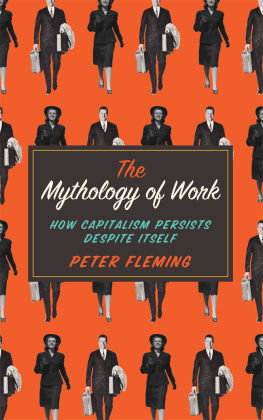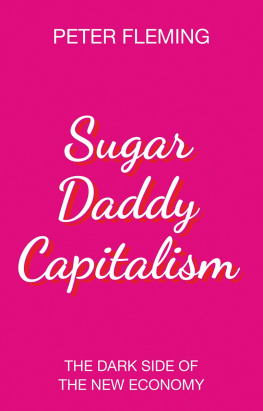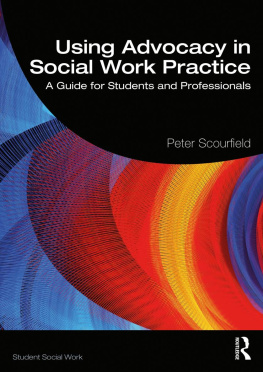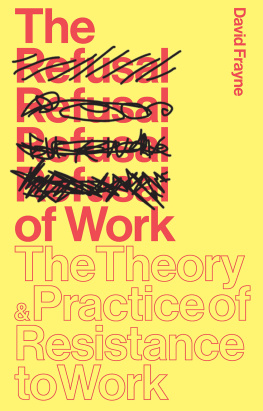The Mythology of Work
The Mythology
of Work
How Capitalism Persists Despite Itself
Peter Fleming

First published 2015 by Pluto Press
345 Archway Road, London N6 5AA
www.plutobooks.com
Copyright Peter Fleming 2015
The right of Peter Fleming to be identified as the author of this work has been asserted by him in accordance with the Copyright, Designs and Patents Act 1988.
British Library Cataloguing in Publication Data
A catalogue record for this book is available from the British Library
ISBN 978 0 7453 3487 5 Hardback
ISBN 978 0 7453 3486 8 Paperback
ISBN 978 1 7837 1299 1 PDF eBook
ISBN 978 1 7837 1301 1 Kindle eBook
ISBN 978 1 7837 1300 4 EPUB eBook
This book is printed on paper suitable for recycling and made from fully managed and sustained forest sources. Logging, pulping and manufacturing processes are expected to conform to the environmental standards of the country of origin.
10 9 8 7 6 5 4 3 2 1
Typeset by Stanford DTP Services, Northampton, England
Text design by Melanie Patrick
Simultaneously printed by CPI Antony Rowe, Chippenham, UK
and Edwards Bros in the United States of America
Contents
Introduction Once Upon a Time, Man Invented Work
Once upon a time, in some faraway corner of that universe which is dispersed into countless solar systems, there was a planet upon which clever animals invented work. Slowly, work lost its association with survival and self-preservation and became a painful and meaningless ritual acted out for its own sake. Taking on a hue of endlessness and inescapability, this curious invention consumed almost every part of the clever beasts lives. Its constant presence kept the order; held certain divisions in place; lavished the few at the top with untold riches. Wonderful discoveries that might have made life easier for its inhabitants like a device called email were twisted into the opposite, scattering dread and unhappiness everywhere. Life-support conditions on the planet became increasingly intolerable as the availability of actual work began to disappear. Strangely, this made the leaders celebrate it even more. The situation was clearly out of hand. Would these poor creatures ever rebel?
Readers of Nietzsche will recognize the paragraph above, echoing his attempt to temper the self-centredness of modern man and the arrogant belief in eternal knowledge. The parable places this conceit in proper historical context and demonstrates the limited specificity of a system that appears universal. This book represents my attempt to do the same with the notion of work. But if man was difficult to dislodge from the throne of infinity then doing the same with work in the present era feels an almost impossible task. And I suggest that this bearing of impossibility is only a recent achievement. Following the postmodern historization of everything during the 1980s and 1990s, work strangely remained one of the few concepts that retained a sense of preordained immutableness perhaps more so following the postmodern turn. This may have something to do with the close sympathies that postmodern relativism enjoyed with the neoliberal capitalist project. Whilst gender, race, sexuality and all other manner of identity positions were deemed up for grabs, capitalism was silently ushered in as the ultimate ontological horizon of social life. It was not that work was beyond question. Rather it was not worthy of questioning. After all, is it not a rather boring notion to be excessively concerned with? And lets face it, dont we actually need work in order to remain distinct from the dark lands of economic backwardness and cultural stasis?
It is no exaggeration to suggest that work has become one of the new false universals of our time. This book seeks to understand why this is so and what we might do about it, since this is by no means a natural state of affairs. But it is easy to forget that given the way work has been implicated in so many social activities we engage in today (from paying the bills to education, to family matters, to choosing a life-long romantic partner for some, and so forth). Work and living more generally are so inextricably entwined that it might seem that questioning the idea of work is a little like questioning life itself. For dont we all have to work to live? No, not really. It is a social construct like any other but the ubiquity it has attained over the last 20 years is quite astonishing. The patent dysfunctions of building a world around our jobs (or lack thereof if we are unemployed) are now becoming clear: not only permanent existential dread, which we have crafted as a way of life in order to tolerate the intolerable, but also the psychical and social damage that so much work has precipitated. Moreover, this trend is not contradicted by the fact that over half the global population eligible for work are currently unemployed. I shall argue that neoliberal rationality has created a neat ideological symbiosis between this strict no alternative attitude we have towards paid employment and its manufactured scarcity (i.e. unemployment). And this serves an important class function under conditions of extreme inequality.
So how and why do many jobs feel so all-encompassing? To put it crudely, why are we working so much today and having difficulty in seeing a life beyond work in both personal and political terms? Of course, the bills have to be paid. But conventional wisdom presents a number of other answers, all of which I suggest are problematic. For example, perhaps the desire to make more money is to blame. Where this explanation falls down is that many organizations dont increase our rewards if we spend more time in the office. And once a certain level of material wealth is obtained, we tend to work for other reasons. What about the fear of unemployment, especially in times of economic crisis and uncertainty? There might be something to this. But marathon-like displays of work are also observed in occupations that are relatively secure and unthreatened by cuts. Perhaps we work so much because we simply love our jobs. Unfortunately, love is not a word used by most of the global workforce when describing their occupations. A recent survey (discussed further in Chapter 1) reveals that only about 13 per cent of the global workforce considered themselves engaged by their jobs. The remaining 87 per cent feel deeply alienated. What about iPhones and email? Mobile technology comes closer to accounting for our work-obsessed culture. Smart phones and laptops mean that we are always contactable and this facilities the creeping encroachment of work over our lives. But this explanation is not completely convincing since there is nothing inherent in mobile technology that forces us to check our emails at 5 a.m. There must be some other social pressure behind it.
These typical accounts of contemporary work tend to overlook its fetishistic character. When we focus on the notion of work, we ought to see it as being only the concrete personification of a broader process. That process is, of course, capitalism. The accumulation of capital in all its variants, including financial or fictitious capital involves the use of a labour process that takes a variety of organizational forms. That labour process is in turn built around exploitation and class relations (i.e. who owns and controls the means of production). What we call work is the social embodiment and ritualistic calculus of that exploitation process. One reason that the ideology of work has got away with its recent exponential growth, becoming a way of life, is that it is still confused with survival and ineluctable necessity. This is one of the great ruses of neoliberal reason: it is able to impose an artificial regime based upon the pretext of organic self-preservation. And who can argue with that? I hope to demonstrate in the following pages that our workers society has little to do with material subsistence, although that doesnt mean our jobs are any less real in terms of the influence and sway work holds over vast numbers of people around the world.















